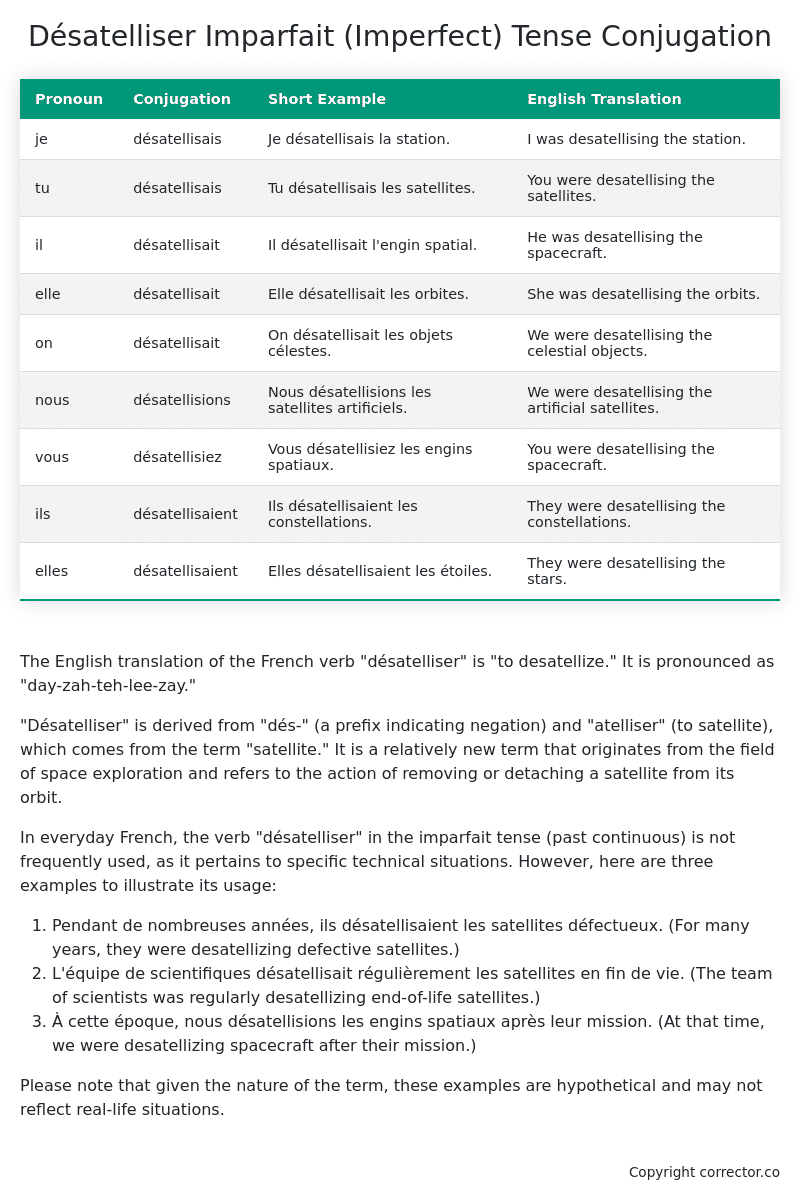Imparfait (Imperfect) Tense Conjugation of the French Verb désatelliser
Introduction to the verb désatelliser
The English translation of the French verb “désatelliser” is “to desatellize.” It is pronounced as “day-zah-teh-lee-zay.”
“Désatelliser” is derived from “dés-” (a prefix indicating negation) and “atelliser” (to satellite), which comes from the term “satellite.” It is a relatively new term that originates from the field of space exploration and refers to the action of removing or detaching a satellite from its orbit.
In everyday French, the verb “désatelliser” in the imparfait tense (past continuous) is not frequently used, as it pertains to specific technical situations. However, here are three examples to illustrate its usage:
- Pendant de nombreuses années, ils désatellisaient les satellites défectueux. (For many years, they were desatellizing defective satellites.)
- L’équipe de scientifiques désatellisait régulièrement les satellites en fin de vie. (The team of scientists was regularly desatellizing end-of-life satellites.)
- À cette époque, nous désatellisions les engins spatiaux après leur mission. (At that time, we were desatellizing spacecraft after their mission.)
Please note that given the nature of the term, these examples are hypothetical and may not reflect real-life situations.
Table of the Imparfait (Imperfect) Tense Conjugation of désatelliser
| Pronoun | Conjugation | Short Example | English Translation |
|---|---|---|---|
| je | désatellisais | Je désatellisais la station. | I was desatellising the station. |
| tu | désatellisais | Tu désatellisais les satellites. | You were desatellising the satellites. |
| il | désatellisait | Il désatellisait l’engin spatial. | He was desatellising the spacecraft. |
| elle | désatellisait | Elle désatellisait les orbites. | She was desatellising the orbits. |
| on | désatellisait | On désatellisait les objets célestes. | We were desatellising the celestial objects. |
| nous | désatellisions | Nous désatellisions les satellites artificiels. | We were desatellising the artificial satellites. |
| vous | désatellisiez | Vous désatellisiez les engins spatiaux. | You were desatellising the spacecraft. |
| ils | désatellisaient | Ils désatellisaient les constellations. | They were desatellising the constellations. |
| elles | désatellisaient | Elles désatellisaient les étoiles. | They were desatellising the stars. |
Other Conjugations for Désatelliser.
Le Present (Present Tense) Conjugation of the French Verb désatelliser
Imparfait (Imperfect) Tense Conjugation of the French Verb désatelliser (You’re reading it right now!)
Passé Simple (Simple Past) Tense Conjugation of the French Verb désatelliser
Passé Composé (Present Perfect) Tense Conjugation of the French Verb désatelliser
Futur Simple (Simple Future) Tense Conjugation of the French Verb désatelliser
Futur Proche (Near Future) Tense Conjugation of the French Verb désatelliser
Plus-que-parfait (Pluperfect) Tense Conjugation of the French Verb désatelliser
Passé Antérieur (Past Anterior) Tense Conjugation of the French Verb désatelliser
Futur Antérieur (Future Anterior) Tense Conjugation of the French Verb désatelliser
Subjonctif Présent (Subjunctive Present) Tense Conjugation of the French Verb désatelliser
Subjonctif Passé (Subjunctive Past) Tense Conjugation of the French Verb désatelliser
Subjonctif Imparfait (Subjunctive Imperfect) Tense Conjugation of the French Verb désatelliser
Conditionnel Présent (Conditional Present) Tense Conjugation of the French Verb désatelliser
Conditionnel Passé (Conditional Past) Tense Conjugation of the French Verb désatelliser
Conditionnel Passé II (Conditional Past II) Tense Conjugation of the French Verb désatelliser
L’impératif Présent (Imperative Present) Tense Conjugation of the French Verb désatelliser
L’impératif Passé (Imperative Past) Tense Conjugation of the French Verb désatelliser
L’infinitif Présent (Infinitive Present) Tense Conjugation of the French Verb désatelliser
L’infinitif Passé (Infinitive Past) Tense Conjugation of the French Verb désatelliser
Le Participe Présent (Present Participle) Tense Conjugation of the French Verb désatelliser
Le Participe Passé (Past Participle) Tense Conjugation of the French Verb désatelliser
Struggling with French verbs or the language in general? Why not use our free French Grammar Checker – no registration required!
Get a FREE Download Study Sheet of this Conjugation 🔥
Simply right click the image below, click “save image” and get your free reference for the désatelliser imparfait tense conjugation!

Désatelliser – About the French Imparfait Tense
NOTE: To take a deep dive into all the French tenses then see our article on Mastering French Tense Conjugation.
Formation of the Imparfait Tense
For regular -er verbs:
For regular -ir verbs
For regular -re verbs
Common Everyday Usage Patterns
Description of Past Habits
Background Information
Mental and Emotional States
It’s employed to express emotions, thoughts, or physical sensations in the past. For example: “J’étais content quand il est arrivé.” (I was happy when he arrived.)
Ongoing Actions
Points to Note About the Imparfait Tense
Passé Composé vs. Imparfait
Conditional
Si Clauses
Narration
I hope you enjoyed this article on the verb désatelliser. Still in a learning mood? Check out another TOTALLY random French verb imparfait conjugation!


